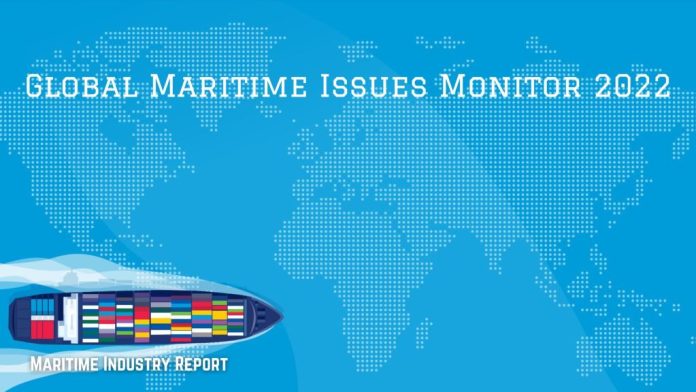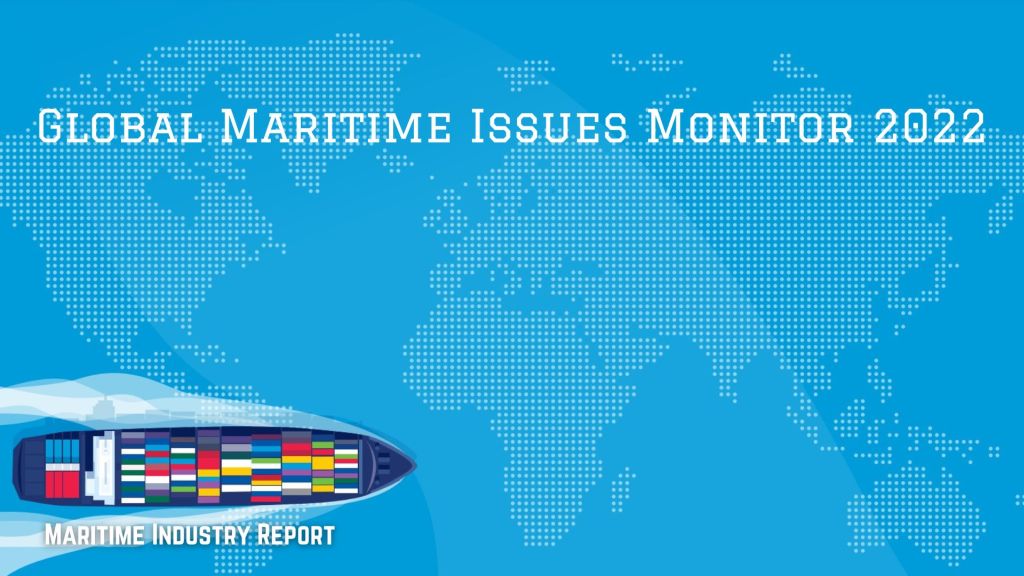
(www.MaritimeCyprus.com) The Global Maritime Issues Monitor 2022 is based on research among senior maritime stakeholders from six continents, and their perceptions of the impact, likelihood, and preparedness on 18 global issues potentially affecting the global maritime industry in the next ten years.
The Global Maritime Forum is an international not-for-profit organization committed to shaping the future of global seaborne trade to increase sustainable long-term economic development and human wellbeing. To serve its mission, the Forum convenes leaders from across the maritime community with policymakers, NGOs, experts, and other influential decision-makers and opinion shapers from all geographies in a community of purpose to discuss collective challenges and to work together on developing new solutions and recommendations for action. In order to do so, the Forum identifies, develops and shares new insights and key issues on the global agenda and facilitates collaborative projects and initiatives that can deliver long-term impact and sustainable change.
The fifth annual Global Maritime Issues Monitor reveals that senior maritime decision-makers believe the maritime industry will be most impacted by the decarbonization of shipping and new environmental regulations in the next decade. At the same time, geopolitical issues and workforce and skill shortages rise in prominence as an area of concern.
The Global Maritime Issues Monitor measures the temperature among senior maritime stakeholders on key issues likely to impact the sector in the next ten years, and the industry’s preparedness to face them.
Jointly published by the Global Maritime Forum, Marsh and the International Union of Marine Insurers, the report finds that the decarbonization of shipping and new environmental regulations are seen as the most impactful issues for the second year in a row. Geopolitical tension and fuel price increases top the rankings in terms of likelihood. The industry feels least prepared for autonomy technology and failure or shortfall in infrastructure.
Geopolitical tension and the war in Ukraine top of mind
Following the war in Ukraine, geopolitical tension has become one of the top concerns in the industry. The industry’s preparedness to face these tensions, however, is still rated as high. Compared to last year’s results, the expected impact of changing trade patterns has likewise increased. Conversely, the survey respondents felt that the industry is less prepared to tackle failure and shortfall in infrastructure.
“The maritime industry has a long history of facing disruptions and uncertainty. The industry’s relative preparedness in the face of recent upsets can likely be linked to its long-standing experience and ability to react to route disruptions and changes in the geopolitical environment, though supply chain uncertainties continue to be a concern,” said Marcus Baker, Global Head of Marine & Cargo, Marsh Specialty.
Likely also due to the war in Ukraine and the disruptions in the energy market, fuel price increases ranked, for the first time, as the issue most likely to occur over the next 10 years.
Decarbonization and other environmental issues seen as the most impactful
Issues linked to decarbonization and climate change – decarbonization of shipping, new environmental regulation, failure of climate change mitigation and adaptation – continue to rate highly across impact and likelihood. For the first time, the industry’s perceived level of preparedness for these issues has increased.
“This year’s findings confirm last year’s trend: decarbonization is a top issue for the maritime industry. Decarbonizing shipping is an enormous challenge, but it is encouraging to see that the industry’s confidence in its ability to overcome this challenge is growing,” commented Richard Turner, President of the International Union of Marine Insurance.
Although rated high, new environmental regulations and decarbonization of shipping dropped from the number one and two spots in likelihood in 2021 to third and fifth, respectively. When asked to comment on the findings of the survey, many observers expressed concern that the war between Russia and Ukraine, with its high impact on energy use, is drawing attention away from climate issues, and not only in the maritime industry.
Human sustainability and workforce shortages an area of concern
This year’s Global Maritime Issues Monitor features a special focus on human sustainability in the maritime workforce, defined as dignity and respect for every human being within an organization and across supply chains to ensure human well-being and ethical practices. Survey respondents were asked about the importance of five human sustainability issues, and how likely it was that their company would implement strategies to address them. In general, the five issues were rated high in importance, and somewhat lower in the likelihood that companies would implement strategies to address them.
Overall, attracting and retaining talent was seen as the most important issue of the deep dive. At the same time, it ranked next to last in terms of expectation that companies will address it. Workforce and skill shortages, an issue in the main part of the survey, moved up in impact and down in preparedness.
“Industry leaders are getting more involved in improving overall human sustainability across the maritime industry, particularly on diversity, equity, and inclusion. Making this a strategic focus is crucial if wanting to attract and retain the workforce of today and the future,” observed Susanne Justesen, Project Director, Human Sustainability, Global Maritime Forum.
Learn more by downloading the Global Maritime Issues Monitor 2022, below:
Source: Global Maritime Forum, Marsh and the International Union of Marine Insurers.














